Hermione Hoby in The Guardian:
 Of all the mantles that have been foisted on Toni Morrison’s shoulders, the heaviest has to be “the conscience of America”. It’s both absurd-sounding and true. For almost half a century her subject has been racial prejudice in the United States, a story that she has told and retold with a steadiness of rage and compassion. Her latest novel, God Help the Child, is her 11th and when I arrive at her apartment in Tribeca, Lower Manhattan, America’s Conscience is having her eyebrows drawn on. “For the photographer,” she explains with a chuckle.
Of all the mantles that have been foisted on Toni Morrison’s shoulders, the heaviest has to be “the conscience of America”. It’s both absurd-sounding and true. For almost half a century her subject has been racial prejudice in the United States, a story that she has told and retold with a steadiness of rage and compassion. Her latest novel, God Help the Child, is her 11th and when I arrive at her apartment in Tribeca, Lower Manhattan, America’s Conscience is having her eyebrows drawn on. “For the photographer,” she explains with a chuckle.
Later, she’ll tell the photographer: “We did makeup for you. I have eyebrows and everything,” then add: “You lose all that stuff … ” The implied second half of that sentence is “when you reach my age”: Morrison turned 84 in February. Her many literary laurels include a Pulitzer in 1988 for Beloved, a Nobel in 1993, and, in 2012, the presidential medal of freedom, from her friend Barack Obama. Being America’s most venerated living writer does not, however, stop a person wanting to look good in pictures. And, it is natural that beauty and the notion of self-image are on her mind as at the centre of her new book is a striking, dark-skinned woman called Bride who tries to shield herself from her own past with surface beautification. A love story unfolds, precariously, between her and Booker, a scholarly young black man adrift in grief for a dead brother. He tells her: “scientifically there’s no such thing as race, Bride, so racism without race is a choice. Taught, of course, by those who need it, but still a choice. Folks who practice it would be nothing without it.”
Bride’s blackness is both the source of her childhood misery – her lighter-skinned mother is so horrified by it that she considers killing her baby – and of her adult success. She works in the fashion and beauty industry where, heeding one stylist’s dictum to dress only in white, she makes herself, “a panther in snow”, an exoticised “other”. The novel intimates that fetishising blackness, both for the observer and the observed, might be just as insidious as outright prejudice. There’s the ex-boyfriend, for example, who seems to claim her as some kind of racial trophy. When this young white man takes her home to his parents it’s clear “that I was there to terrorise his family, a means of threat to this nice old white couple. ‘Isn’t she beautiful?’ he kept repeating … His eyes were gleaming with malice.”
More here. (Note: Throughout February, at least one post will honor The Black History Month. This year’s theme is “African Americans and the Vote.” Readers are encouraged to send in their suggestions)

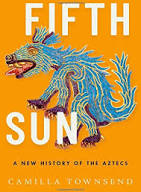 It is to Townsend’s credit that she does not attempt to be comprehensive. The cosmology of the Aztecs, their calendar, gods and myths, get only glancing treatment here. This is a brief history, and one told subtly and well, primarily through the lives of individuals. First among them is the woman baptised by the Spanish as Marina and known in Nahuatl as Malintzin, re-hispanicised as Malinche – a name that would become a synonym for traitor. Born to a noble lineage of a people unhappily subject to Aztec rule, she was offered as a tribute payment to the Mexica and then sold to the Chontal Maya on the Yucatán coast, one of the first communities to encounter Cortés’s ships. Given away again to the Spaniards, she survived by making herself indispensable, serving as Cortés’s concubine and interpreter as he tortured and slaughtered his way around the continent. Townsend has elsewhere devoted an entire book, Matlintzin’s Choices, to her resurrection. She emerges here as a complex and sympathetic figure, able – as indigenous Mexicans would be for generations to come – to hold many worlds within herself at once.
It is to Townsend’s credit that she does not attempt to be comprehensive. The cosmology of the Aztecs, their calendar, gods and myths, get only glancing treatment here. This is a brief history, and one told subtly and well, primarily through the lives of individuals. First among them is the woman baptised by the Spanish as Marina and known in Nahuatl as Malintzin, re-hispanicised as Malinche – a name that would become a synonym for traitor. Born to a noble lineage of a people unhappily subject to Aztec rule, she was offered as a tribute payment to the Mexica and then sold to the Chontal Maya on the Yucatán coast, one of the first communities to encounter Cortés’s ships. Given away again to the Spaniards, she survived by making herself indispensable, serving as Cortés’s concubine and interpreter as he tortured and slaughtered his way around the continent. Townsend has elsewhere devoted an entire book, Matlintzin’s Choices, to her resurrection. She emerges here as a complex and sympathetic figure, able – as indigenous Mexicans would be for generations to come – to hold many worlds within herself at once.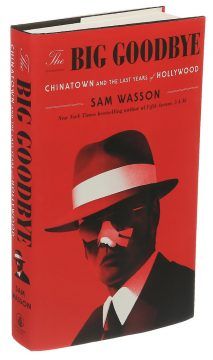 The film “Chinatown” was meticulously designed to capture a precise moment in Los Angeles’s history. Everything about its look and feel says 1937, not 1936 or 1938. In the same way, “The Big Goodbye,” Sam Wasson’s deep dig into the making of the film, is a work of exquisite precision. It’s about much more than a movie. It’s about the glorious lost Hollywood in which that 1974 movie was born.
The film “Chinatown” was meticulously designed to capture a precise moment in Los Angeles’s history. Everything about its look and feel says 1937, not 1936 or 1938. In the same way, “The Big Goodbye,” Sam Wasson’s deep dig into the making of the film, is a work of exquisite precision. It’s about much more than a movie. It’s about the glorious lost Hollywood in which that 1974 movie was born.
 Christian List in the Boston Review:
Christian List in the Boston Review: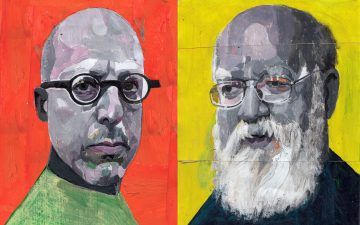 Daniel C Dennett and Gregg D Caruso debate free will in Aeon:
Daniel C Dennett and Gregg D Caruso debate free will in Aeon: V.S. Naipaul in the New York Review of Books:
V.S. Naipaul in the New York Review of Books: Matthew Yglesias in Vox:
Matthew Yglesias in Vox: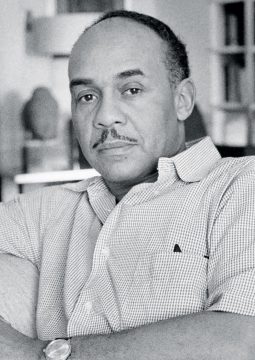 ANY OPPORTUNITY TO READ A GREAT WRITER’S MAIL should be embraced in these days when a serial Instagram feed is about as ambitious as correspondence gets. Granted, at roughly a thousand pages, The Selected Letters of Ralph Ellison may be asking a lot, at the outset, of even the most committed scholar of twentieth-century American literature, to say nothing of the waves of readers who continue to come away from Invisible Man convinced that it’s the Great American Novel.
ANY OPPORTUNITY TO READ A GREAT WRITER’S MAIL should be embraced in these days when a serial Instagram feed is about as ambitious as correspondence gets. Granted, at roughly a thousand pages, The Selected Letters of Ralph Ellison may be asking a lot, at the outset, of even the most committed scholar of twentieth-century American literature, to say nothing of the waves of readers who continue to come away from Invisible Man convinced that it’s the Great American Novel. Before Audrey Hepburn shimmied into that iconic black dress and dangled her cigarette holder between two fingers, the story of Holly Golightly existed only between the covers of Truman Capote’s beloved novella. Way back in 1958, our reviewer summed it up in words that hold true to this day: “‘Breakfast at Tiffany’s’ is a valentine of love, fashioned by way of reminiscence, to one Holly Golightly … a wild thing searching for something to belong to.”
Before Audrey Hepburn shimmied into that iconic black dress and dangled her cigarette holder between two fingers, the story of Holly Golightly existed only between the covers of Truman Capote’s beloved novella. Way back in 1958, our reviewer summed it up in words that hold true to this day: “‘Breakfast at Tiffany’s’ is a valentine of love, fashioned by way of reminiscence, to one Holly Golightly … a wild thing searching for something to belong to.” A young woman—observant, self-conscious, harboring literary aspirations, though not quite sure where she wants to end up—meets an older novelist, and they start dating. He is as famous as it’s possible for a contemporary writer to be. He is obsessed with his privacy: She is not to draw any attention, occupying a hidden corner of his life. In fact, he sets all the terms of their relationship; the age gap benefits him. While there’s plenty of desire, it’s tinged with condescension (even spite), which contributes more than it should to their sexual tension.
A young woman—observant, self-conscious, harboring literary aspirations, though not quite sure where she wants to end up—meets an older novelist, and they start dating. He is as famous as it’s possible for a contemporary writer to be. He is obsessed with his privacy: She is not to draw any attention, occupying a hidden corner of his life. In fact, he sets all the terms of their relationship; the age gap benefits him. While there’s plenty of desire, it’s tinged with condescension (even spite), which contributes more than it should to their sexual tension.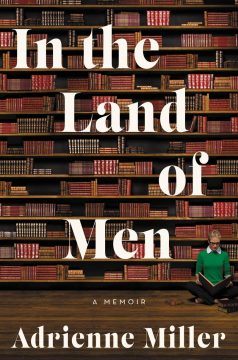
 About 50,000 years ago, ancient humans in what is now West Africa apparently procreated with another group of ancient humans that scientists didn’t know existed.
About 50,000 years ago, ancient humans in what is now West Africa apparently procreated with another group of ancient humans that scientists didn’t know existed. For
For  Tackiness gets a bad rap because it makes us feel like suckers. It offends our belief that we deserve better. We are allowed to marvel at top-shelf wax statues of celebrities or modern movie blockbusters because they meet some implicit standard of verisimilitude, because they look “real”: it’s okay to be crassly entertained so long as that entertainment passes some bar of acceptability. Anything that fails that standard is generally held to be tawdry or kitschy or cheesy—to be, in other words, beneath our esteem.
Tackiness gets a bad rap because it makes us feel like suckers. It offends our belief that we deserve better. We are allowed to marvel at top-shelf wax statues of celebrities or modern movie blockbusters because they meet some implicit standard of verisimilitude, because they look “real”: it’s okay to be crassly entertained so long as that entertainment passes some bar of acceptability. Anything that fails that standard is generally held to be tawdry or kitschy or cheesy—to be, in other words, beneath our esteem. I had to fight for Prozac Nation because everyone wanted it to be a novel. They really thought that I should write a novelized version of my life. The whole thing was: “Who are you? Why would anybody care about your life? If you’re talented, you can write a novel, because you can invent something.” It’s not like I couldn’t do that. It’s not like it couldn’t have been a novel. But I don’t want to write novels. It’s terrible that men make the rules, and that men have decided that novels are somehow more valuable. It’s really, really, really hard to write about yourself. Women who have written about their own lives should be getting the Nobel Prize. Those are the only people who should be getting the Nobel Prize from now on because it’s really hard to do. It’s not that hard to write about politics. Read a book and you can do it. It’s not that hard to write about Donald Trump, or for that matter Afghanistan. It is really hard to figure out the stuff that scares people. I’m not doing this because I need to figure myself out. I have myself figured out. I’m doing it because other people need to figure themselves out. I’m not writing about myself. I’m writing about other people. It’s a really cheap thing to think that all I’m doing is writing about my life, as if that’s some easy thing.
I had to fight for Prozac Nation because everyone wanted it to be a novel. They really thought that I should write a novelized version of my life. The whole thing was: “Who are you? Why would anybody care about your life? If you’re talented, you can write a novel, because you can invent something.” It’s not like I couldn’t do that. It’s not like it couldn’t have been a novel. But I don’t want to write novels. It’s terrible that men make the rules, and that men have decided that novels are somehow more valuable. It’s really, really, really hard to write about yourself. Women who have written about their own lives should be getting the Nobel Prize. Those are the only people who should be getting the Nobel Prize from now on because it’s really hard to do. It’s not that hard to write about politics. Read a book and you can do it. It’s not that hard to write about Donald Trump, or for that matter Afghanistan. It is really hard to figure out the stuff that scares people. I’m not doing this because I need to figure myself out. I have myself figured out. I’m doing it because other people need to figure themselves out. I’m not writing about myself. I’m writing about other people. It’s a really cheap thing to think that all I’m doing is writing about my life, as if that’s some easy thing.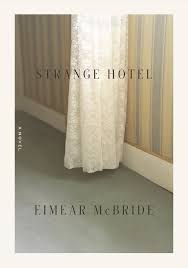 ‘Not all hotels are created equal,’ observes McBride’s narrator; yet ‘once distilled all hotel rooms are essentially alike, if not exactly the same’. She should know: Strange Hotel records an exhausting fictional itinerary of nights spent in, by my count, more than 170 cities, from Dublin to Delhi and further afield. For the most part, these stopovers appear in the simple form of lists, an occasional cryptic ‘x’ denoting, we eventually infer, those occasions when the narrator chooses to forgo her solitude, if not her loneliness, in favour of a casual sexual hook-up. Five rooms, though, come into sharper focus in the novel’s main narrative sections, set in Avignon, Prague, Oslo, Auckland and Austin. Or, more precisely, set in the small and temporarily hospitable space of a hotel room in each city, ‘a place built for people living in a time out of time’.
‘Not all hotels are created equal,’ observes McBride’s narrator; yet ‘once distilled all hotel rooms are essentially alike, if not exactly the same’. She should know: Strange Hotel records an exhausting fictional itinerary of nights spent in, by my count, more than 170 cities, from Dublin to Delhi and further afield. For the most part, these stopovers appear in the simple form of lists, an occasional cryptic ‘x’ denoting, we eventually infer, those occasions when the narrator chooses to forgo her solitude, if not her loneliness, in favour of a casual sexual hook-up. Five rooms, though, come into sharper focus in the novel’s main narrative sections, set in Avignon, Prague, Oslo, Auckland and Austin. Or, more precisely, set in the small and temporarily hospitable space of a hotel room in each city, ‘a place built for people living in a time out of time’.